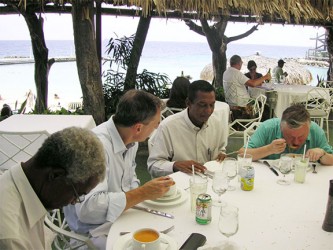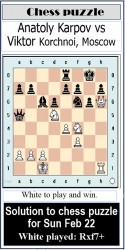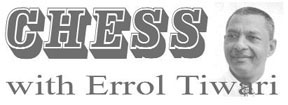It was a distinct privilege for me to meet Russian grandmaster and former world chess champion Anatoly Karpov once in Nassau and subsequently in Curacao. Readers would recall that Karpov became world champion in 1975 on default when America’s Bobby Fischer failed to defend his championship title. It was an honour for me, therefore, to dine with the inimitable 12th world chess champion! At the end of last year, Karpov gave an in-depth interview to the Russian newspaper Sport Express. The interview was enlightening and explored topics associated with chess and some which weren’t, but which readers may still find captivating.
Here is an excerpt of the Sports Express interview:
SE: What was your most unusual New Year?
AK: I can remember the New Year that I celebrated the least. I spent the entire night from 1971 to 1972 playing chess. It was the traditional English tournament in Hastings. I was playing the last game. I had to win. Four rounds before the end I was 2.5 points ahead of Kortchnoi, but then I lost a game, followed by two draws and Kortchnoi began to win. To finish first, I had to beat the British player Markland, who was not even a grandmaster. The game was set for 11 pm, which meant well after midnight Moscow time. I went to the hotel and sat down to prepare myself. Two hours later I went there and by five in the morning Moscow time I had won. I have often spent New Year abroad: in 1966 in Czechoslovakia, in 1968 in Holland. In 1972 I was with Paul Keres in Mexico. The return from this trip was an adventure.
AK: The flight was suddenly cancelled and we did not come with a direct flight to Europe. Today in the Internet age, it is all very simple. At the time Paul Petrovich [Keres] saved us. He had interesting hobbies. He owned one of the most fabulous record collections in the Soviet Union; he had many first editions. It wasn’t this hobby that helped us in Mexico, but another. He always had the flight plans of different airlines, so Keres sat down and put together a route. We then flew as follows: Mexico – USA- Montréal – Amsterdam – Prague – Moscow. The alternative would have been to wait for five days.
SE: The brain of a chess player is somewhat special. Have you noted changes with age?
AK: The speed is different. The reaction is not as good as before. I no longer play at the level of the greatest chess players on the planet.
SE: What do they have over you? How are they better?

AK: They have better knowledge. They sit at the computer several hours a day. I definitely do not. I play at the board. On the other hand if I come out of the opening without being in a situation where someone ‘caught’ me, the position is still acceptable. Then I have problems with no one. Also, because the quality of the players has worsened. In the autumn, Carlsen and Anand were playing, and I came to the final. The FIDE Vice President Georgios Makropoulos came to me and said: “Judging by today’s games, even an out-of-shape Karpov would beat either of them…”
SE: Has your memory worsened?
AK: It takes longer to remember variants.
SE: Is there someone who stood out for his amazing memory?
AK: Yury Balashov was unique. In the Botvinnik School, he already knew every participant of every Soviet Championship, including every game, and of course, the results. He could instantly calculate on which day of the week, let’s say, March 5, 1923, fell. The answer came after one second. He had special techniques.
SE: Why didn’t Balashov become a great player?
AK: Memory is an important tool, but not the most important. My father had, as far as technique, a fantastic memory.
SE: Could you give an example?
AK: He was chief engineer at a plant in Tula. Thirteen thousand workers. You can imagine how much detail went on there. My father had the nationally defined standards of each individual worker in his head! That was an eight-digit number followed  by some letters. My memory is not as good as my father’s.
by some letters. My memory is not as good as my father’s.
SE: Are there countries you may have missed?
AK: No, nor is there a big city I have not been to.
SE: The following story is known. During the World title fight against Korchnoi, in 1978 in Baguio, someone tried to poison you. The special security measures taken were obviously not in vain.
AK: We had expected trouble. Even as we prepared for the match with Fischer. In these battles, it was not just about chess. For Korchnoi, as far as the general situation was concerned, it was even more complicated. The Filipinos were very friendly towards me. Personal contacts play a very important role. In Baguio, on the organizer’s side, I was looked after by a former pilot of Eisenhower. (The Karpov interview is to be continued.)
In other news, the 2015 European Chess Championship opened on Monday amid some entertaining fanfare in Jerusalem, Israel. One hundred and fifteen grandmasters and other lower-ranked players were treated not to the sedate affair of welcoming speeches, but rather to an exciting display of mind reading, magic acts and prominent percussion performances. The main attraction for the evening was a stunning performance of mind reading by the world famous Lior Sushard which amazed the speechless grandmasters and others in the audience.
Chess games
The following games were played at the Zurich Chess Challenge Rapid Tournament on February 19, 2015. Russian grandmaster Vladimir Kramnik won the tournament.
White Viswanathan Anand
Black Fabiano Caruana
1. d4 d6 2. e4 g6 3. Nc3 Bg7 4. f4 c6 5. Nf3 b5 6. Bd3 Nd7 7. e5 Nb6 8. O-O Nh6 9. a4 b4 10. Ne4 O-O 11. c4 Bg4 12. Nf2 Bf5 13. Bxf5 Nxf5 14. g4 Nh6 15. b3 f5 16. g5 Ng4 17. Nd3 c5 18. h3 h5 19. hxg4 fxg4 20. Nh4 cxd4 21. Nxg6 Qd7 22. a5 1-0.
White Sergey Karjakin
Black Vladimir Kramnik
1. Nf3 d5 2. g3 Nf6 3. Bg2 c6 4. c4 dxc4 5. O-O Nbd7 6. Na3 Nb6 7. Ne5 Be6 8. Qc2 g6 9. Naxc4 Nxc4 10. Nxc4 Bg7 11. Rd1 O-O 12. d4 Qc8 13. e4 Rd8 14. Bf4 Ne8 15. Ne5 Bh3 16. Qb3 Nd6 17. Rac1 Bxg2 18. Kxg2 Qe6 19. Qxe6 fxe6 20. Kf3 a5 21. a4 Ra6 22. b3 Nf7 23. Nxf7 Kxf7 24. e5 Rd5 25. Ke4 b5 26. Rd3 Rb6 27. Bd2 bxa4 28. bxa4 Rb2 29. f4 Ra2 30. Rc4 g5 31. h3 gxf4 32. Bxf4 h5 33. h4 Ra1 34. Rb3 Re1+ 35. Kf3 Rd1 36. Be3 Rf1+ 37. Ke2 Ra1 38. Bf4 Kg6 39. Bg5 Ra2+ 40. Kf3 Kf5 41. Bxe7 Bh6 42. Bd6 Rd2 43. Bc5 Rd7 44. Rb8 Rf7 45. Rg8 Rd3+ 46. Kg2 Rd2+ 47. Kh3 Ke4 48. Rc1 Be3 49. Rh8 Rf3 50. Rxh5 Bf4 51. Re1+ Kd5 52. Kg4 Bxg3 53. Kxf3 Bxe1 54. Rh8 Rf2+ 55. Kg4 Ke4 56. Kg5 Bc3 57. Rd8 Be1 58. Rd6 Rg2+ 59. Kf6 Bxh4+ 60. Kxe6 Ra2 61. Kd7 Rxa4 62. e6 Rc4 63. e7 Bxe7 64. Re6+ Kd3 65. Rxe7 a4 66. Kxc6 a3 67. Ra7 Rc3 68. d5 1-0 .
White Hikaru Nakamura
Black Vladimir Kramnik
1. c4 e6 2. Nf3 d5 3. g3 dxc4 4. Bg2 Nd7 5. Qa4 a6 6. Qxc4 b5 7. Qc2 Bb7 8. O-O Ngf6 9. d3 c5 10. a4 Be7 11. Nc3 Qb6 12. Qb3 b4 13. a5 Qd8 14. Nb1 Bd5 15. Qc2 O-O 16. Nbd2 Nb8 17. Rd1 Ra7 18. e4 Ba8 19. Nb3 Rc7 20. Be3 Nbd7 21. Qe2 Bc6 22. Nfd2 Bb5 23. Nc4 Rc8 24. e5 Nd5 25. Bd2 Nb8 26. h4 Nc6 27. Qg4 Kh8 28. Bg5 Rc7 29. Be4 h6 30. Bd2 f5 31. exf6 Nxf6 32. Qxe6 Nxe4 33. Qxe4 Bf6 34. Be3 Re7 35. Qg4 Bxb2 36. Rab1 Bd4 37. Nxd4 cxd4 38. Bf4 Bxc4 39. dxc4 Qe8 40. Qh3 Re2 41. Qg2 Qg6 42. Qf3 Re4 43. Qg2 Qe6 44. Bd6 Re8 45. Bxb4 Nxb4 46. Kh2 Qd6 47. Qf3 d3 48. Kg2 Re2 49. Qh5 Rf8 0-1.






